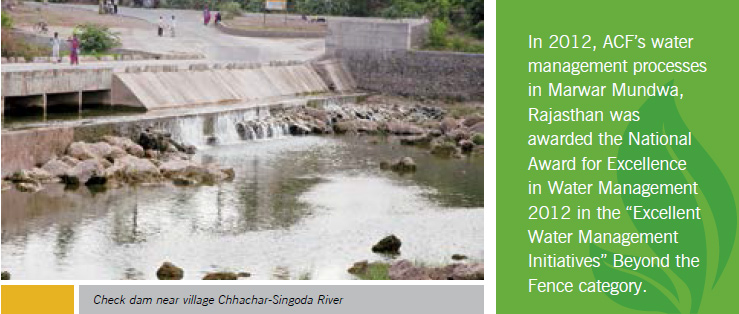



















 |
 |
 |
 |
 |
 |
 |
 |
 |
 |
 |
 |
 |
 |
 |
 |
 |
 |
 |
 |
 |
| the roof top rain water harvesting
structures. Farmers are now able to grow multiple crops in many areas; while in coastal Gujarat, our efforts to mitigate salinity are bearing positive results. Collaboration with various state Governments, local NGOs and academic institutions to implement various state specific water conservation programmes has also ensured success of the programme. Our work over the years have also bagged us considerable appreciation at the National level. In 2012, ACF’s water management processes in Marwar Mundwa, Rajasthan was awarded the National Award for Excellence in Water Management 2012 in the “Excellent Water Management Initiatives” Beyond the Fence category. Agro based livelihoods With more than 70% of communities in our intervention area involved in agriculture and allied activities, ACF has developed a strong agro-based livelihood generation programme based on sustainable farming practices. Our work bridges the gap between technology and farming, thus empowering farmers to develop farming practices that are both |
sustainable and
profitable in the long run.
ACF’s agro-based livelihood programme
is implemented in most of our locations
through a multi-pronged approach.
In Punjab and Uttarakhand, ACF
promotes organic farming, revival, and
storage of seeds for exchange. In West
Bengal, our project on Systematic Rice
Intensification (SRI) is reaping benefits
for farmers due to low investment and
better productivity. ACF also promotes
allied activities of horticulture, kitchen
gardening, aqua culture and dairy
farming amongst women. Better Cotton Initiative is an example - one that is sustainable and profitable to both people and the planet. This is a five year project initiated in 2010 – 11 at five locations in India, focusing on capacity building of farmers and social issues of cotton cultivation and linking the better cotton with direct supply chain in a transparent manner. In 2012, we reached out to more than 7100 farmers from 377 learning groups. The aim of BCI projects is now slowly visible in the form of the reduced use of chemical fertilizers and pesticides by farmers. |
We are also
promoting producers organization with
our BCI farmers which is paving for
sustainability for this project.
As part of efforts to reduce our carbon footprint, ACF work closely with the Geo cycle division of the Company to reuse biomass. Agricultural wastes are collected from farmers, and used as a source of alternate fuel at Ambuja Cements’, bringing in some additional income for farmers, and to make best use of agricultural waste. Our work has found support through partnership with various government organisations, NABARD and regional Krishi Vigyan Kendras (KVK). The KVK in Kodinar, Gujarat, established by ACF in 2007, it offers regular on- and off-campus training, field visits and demonstration of new technologies to more than 51626 farmers in Junagadh district till date. We also collaborate with various agricultural universities, and encourage scientists to share its knowledge and best practices with the community. |
| Ambuja Cements Limited |
 |